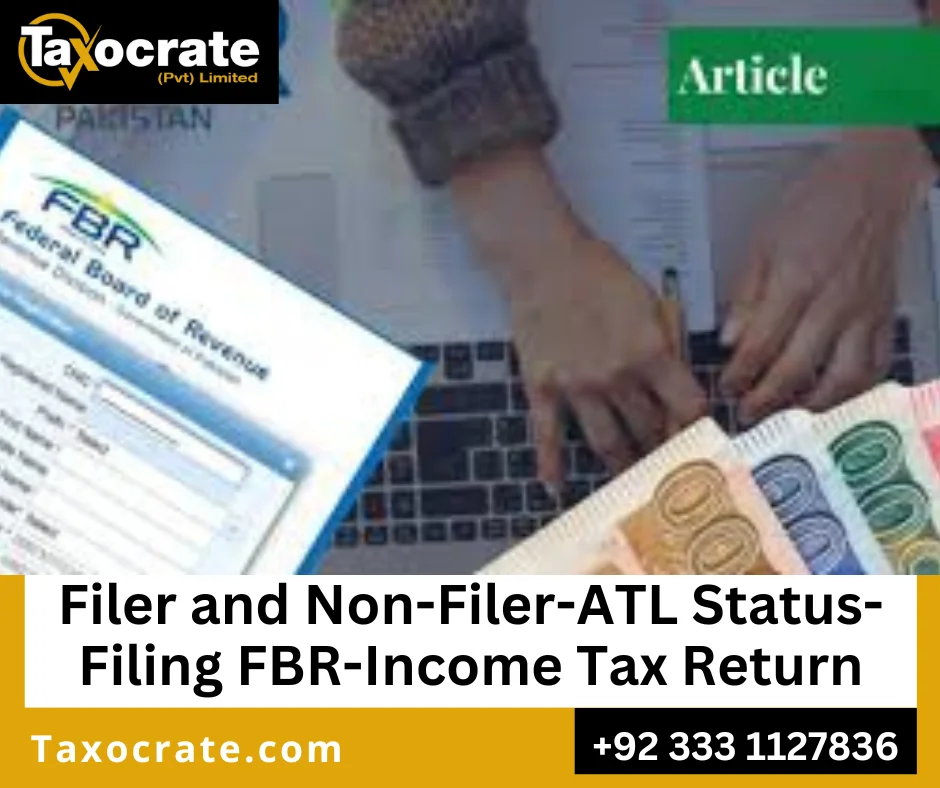Filer and Non-Filer-ATL Status-Filing FBR-Income Tax Return
Filer and Non-Filer | FBR Income Tax Return
Understanding Filers and Non-Filers in Pakistan: Benefits Procedure and Taxation Insights
What is a Filer and Non-Filer in Pakistan? Who is called a filer in Pakistan? How to become a tax filer? Why become a filer? What is the Active Taxpayers List (ATL)? Why become a filer? What are the benefits of becoming a filer? What are the disadvantages of being a non-filer? All of these questions are being addressed to provide the general public with a clear understanding of the concept and procedure of taxation in Pakistan.

Filer and Non-Filer: What Does It Mean?
Understanding FBR Income Tax Return Filers
Introduction to Filers and Non-Filers
The terms “filer and non-filer” are pivotal in the realm of income tax in Pakistan, denoting critical distinctions in an individual’s or business’s fiscal responsibilities. A ‘filer’ refers to an entity or individual who has duly submitted their income tax returns within the stipulated period, thereby ensuring compliance with national tax regulations. Conversely, a ‘non-filer’ is someone who has not fulfilled this obligation, resulting in a non-compliance status that can have significant repercussions.
The Importance of Filing Income Tax Returns and Its Benefits for Filers in Pakistan
Filing income tax returns is more than just a statutory requirement; it is fundamental to maintaining transparency and accountability in a nation’s financial system. For individuals and businesses alike, filing returns with the Federal Board of Revenue (FBR) secures a plethora of advantages. Filers enjoy lower tax rates, eligibility for tax rebates, and the ability to carry forward losses to offset future taxable income. Additionally, being a filer enhances one’s creditworthiness and eligibility for loans and various economic incentives.
Role and Responsibilities of the Federal Board of Revenue in Pakistan’s Tax System
The FBR, or the Federal Board of Revenue, plays a crucial role in managing and overseeing tax collection in Pakistan. This governmental body is tasked with the administration of tax laws, the collection of taxes, and ensuring taxpayer compliance. The FBR’s initiatives are aimed at broadening the tax base, reducing evasion and avoidance, and fostering a culture of voluntary tax compliance among the populace.
The Strategic Importance of Being a Filer and the Role of Tax Lawyers in Karachi
For both individuals and corporate entities, the distinction between being a filer and non-filer is not just legal but also financially strategic. It is imperative to consult with tax return filing lawyers in Karachi for expert advice and seamless compliance. Such professional guidance ensures that taxpayers fulfill their obligations accurately and on time, thereby avoiding penalties and fostering a transparent fiscal environment. Understanding these terms and the role of the FBR is essential for every taxpayer, ensuring both legal conformance and optimized fiscal health.

The Active Taxpayers List and the Process of Becoming a Filer in Pakistan
Filers appear on the “Active Taxpayers” list compiled by the Federal Revenue Service. To appear on the list (which is briefly called ATL), every taxpayer must submit his annual income tax return through FBR’s online portal. A filer is an individual or entity that is recognized by the Federal Board of Revenue (FBR) as compliant with the legal obligations to submit income tax returns. To qualify as a filer, an individual or business must follow the prescribed process of preparing and submitting detailed accounts of their income, deductions, and tax liabilities within the stipulated deadlines.
The Step-by-Step Process of Filing Income Tax Returns in Pakistan
The process of tax return filing begins with the collection of relevant financial records, such as pay slips, bank statements, and receipts for deductible expenses. Taxpayers must log into the FBR’s online portal and fill out the appropriate tax return forms, which are tailored to different types of income and business activities. The FBR provides specific forms for salaried individuals, professionals, companies, and other entities. Accurate reporting on these forms is crucial to ensure compliance and avoid potential legal issues.
Who is Required to File Income Tax Returns in Pakistan?
A diverse range of individuals and businesses are required to file income tax returns. This includes salaried persons whose annual income surpasses the exemption threshold set by the FBR, self-employed professionals like doctors and lawyers, business owners, and companies of all sizes. Additionally, individuals holding foreign assets, or those who earned foreign income, must also file returns. For corporate entities, quarterly advance tax payments might also be part of the filing obligations.
The Importance of Timely Income Tax Return Filing in Pakistan
Timeliness is a critical aspect of the filing process. The FBR sets specific deadlines for the submission of income tax returns, and adherence to these deadlines is necessary to maintain filer status. Filing within the prescribed timeframe offers multiple benefits, including eligibility for lower withholding tax rates and avoidance of penalties and fines. Moreover, being a filer enhances an individual’s or a business’s credibility and can facilitate smoother financial transactions.
Benefits of Being a Filer
Being a filer in Pakistan, particularly with the Federal Board of Revenue (FBR), carries a multitude of advantages that significantly benefit an individual or business entity. One of the primary perks is the considerably lower tax rates. Filers enjoy reduced tax liability on various transactions including property purchases, vehicle registration, and banking transactions. This stands in stark contrast to the higher rates non-filers are subjected to, making the financial savings appreciable.
Another notable benefit is the avoidance of penalties. Non-filers face strict penalties from the FBR, which can include fines and, in extreme cases, legal action. By ensuring compliance with FBR income tax return filing, individuals can sidestep these punitive measures, thus safeguarding themselves from financial and legal repercussions.
Tax filers also become eligible for tax refunds, a significant financial advantage. When a filer overpays their taxes, they can claim the excess amount back from the FBR. This feature ensures that individuals do not lose money to the tax system unnecessarily and can retain greater control over their finances.

How Being a Filer Enhances Creditworthiness and Business Opportunities in Pakistan
Moreover, being a filer greatly enhances one’s creditworthiness. Financial institutions often scrutinize credit history and tax compliance as part of their evaluation process. Filers demonstrate financial discipline and responsibility, which translates into higher chances of loan approvals, better interest rates, and enhanced credit facilities. Furthermore, this compliance is often a prerequisite for participation in various government tenders, providing expanded business opportunities.
Expert Return Filing Lawyers in Karachi: Simplifying Tax Compliance and Accuracy
For those seeking assistance, engaging the services of return filing tax lawyers in Karachi can streamline the process, ensuring accuracy and compliance. These tax return filing lawyers in Karachi are well-equipped to navigate the complexities of tax laws, offering expert advice and facilitating a seamless filing experience.
Benefits of FBR Income Tax Return Filing: Unlocking Financial and Operational Advantages
In essence, the commitment to FBR income tax return filing not only fulfills a legal obligation but also opens doors to numerous financial and operational benefits. Whether it’s through reduced tax rates, penalty avoidance, eligibility for refunds, or improved creditworthiness, the advantages of being a filer are substantial and far-reaching.
Who is called a Non-Filer in Pakistan?
Non-Filers are the persons who do not register themselves with the FBR and thus they don’t have their NTN, or they have their NTN numbers but do not pay their income tax and also do not file their annual income tax returns. Because of non-filing of tax returns, FBR calls them non-filers.
Consequences of Being a Non-Filer
FBR introduced a withholding tax under the Income Tax Ordinance 2001 for non-filers with a double withholding rate to differentiate between filers and non-filers in Pakistan. Non-filers do not appear on the “Active Taxpayers” list compiled by the Federal Revenue Service. To appear on the list (which is briefly called ATL), every taxpayer must submit his annual income tax return through FBR’s online portal. Being categorized as a non-filer by the Federal Board of Revenue (FBR) carries a range of significant drawbacks. One of the most immediate consequences is the imposition of higher withholding tax rates. For instance, non-filers are subjected to elevated rates on various types of income and transactions, such as salary payments, bank withdrawals, and property transactions. This punitive measure is designed to incentivize compliance with income tax return filing obligations.
Key Differences Between a Filer and a Non-Filer
- A filer is a taxpayer who submits their annual income tax return to the FBR, while a non-filer fails to do so.
- Filers are listed on the Active Taxpayers List (ATL), whereas non-filers are not included in this list.
- A filer enjoys lower withholding tax rates on banking transactions, property purchases, and vehicle registrations, while a non-filer is subject to higher rates.
- Filers are eligible for certain tax exemptions and benefits, but non-filers cannot access these privileges.
- A filer demonstrates compliance with Pakistan’s tax laws, while a non-filer risks penalties and legal actions for non-compliance.
- Non-filers face restrictions on purchasing property or vehicles above certain values, whereas filers do not encounter such limitations.
- Filers contribute to the national economy by paying their fair share of taxes, while non-filers avoid this responsibility.
- A filer can apply for government incentives and subsidies, which are not available to a non-filer.
- Filers experience smoother financial transactions with banks and government departments compared to non-filers.
- While a filer upholds their civic duty, a non-filer risks tarnishing their financial and legal reputation.
- A filer can easily avail tax refunds on overpaid taxes, whereas a non-filer cannot claim such refunds.
- Non-filers face additional scrutiny from the Federal Board of Revenue, while filers are generally considered compliant citizens.
- A filer pays reduced withholding tax on dividends and profits from investments, while a non-filer incurs higher tax rates on the same.
- Filers have the advantage of accessing lower tax rates on property rentals, while non-filers pay significantly higher amounts.
- Non-filers are often excluded from participating in government auctions or tenders, while filers face no such restrictions.
- A filer can avail of tax credits on charitable donations and investments, which are not accessible to a non-filer.
- Non-filers are charged double withholding tax when purchasing airline tickets compared to filers.
- Filers experience fewer hurdles when applying for financial loans or credit facilities, while non-filers may face rejections or delays.
- A filer’s legal and financial standing improves with regular tax compliance, whereas a non-filer’s reputation may be negatively impacted.
- Non-filers are frequently targeted in FBR campaigns for tax recovery, while filers enjoy peace of mind due to timely compliance.
Challenges Non-Filers Face in Accessing Financial Opportunities and Services
Non-filers in Pakistan face significant hurdles that go beyond mere financial penalties. The consequences of remaining a non-filer extend into the realm of financial opportunities and essential services, ultimately limiting personal and professional growth. Below, we explore the challenges non-filers encounter and how these affect their access to financial facilities, investments, and more.
Restricted Access to Banking Facilities
One of the primary challenges non-filers face is the difficulty in accessing essential banking services. Many financial institutions in Pakistan require proof of tax compliance before granting certain privileges. For example, non-filers often find it challenging to acquire credit cards or loans, as banks consider tax compliance a sign of financial responsibility. Non-filers may also encounter additional scrutiny during account opening processes or while applying for advanced banking services, further limiting their financial flexibility.
Barriers to Acquiring Loans
Non-filers are often excluded from eligibility for personal or business loans. Banks and lending institutions require proof of tax filing as part of their due diligence process. This requirement acts as a safeguard for institutions, ensuring that their clients are legally compliant and financially stable. Without filing an income tax return, non-filers cannot provide this proof, leaving them at a disadvantage when seeking financial assistance.
Higher Costs for Non-Filers in Financial Transactions
In addition to restricted access, non-filers often incur higher costs in financial transactions. For instance, when withdrawing large sums of money from banks, non-filers are subject to higher withholding tax rates compared to filers. This not only creates a financial burden but also discourages individuals and businesses from growing their financial portfolios.
Limited Investment Opportunities
Non-filers face significant barriers when trying to invest in lucrative financial markets. Whether it’s purchasing property, stocks, or mutual funds, an up-to-date tax record is often a prerequisite for these transactions. Many investment platforms require clients to submit proof of being a filer before granting access to investment opportunities. This restriction not only hinders wealth creation for non-filers but also narrows the scope of their financial growth.
Exclusion from Government Initiatives
Government-led financial initiatives and incentives are often designed to benefit tax-compliant individuals and entities. Non-filers are usually excluded from such programs, which could include subsidized housing schemes, investment opportunities in public sector projects, or tax credits on specific expenditures. This exclusion places non-filers at a distinct disadvantage, further widening the gap between them and tax-compliant citizens.
Impact on Professional Reputation
Being a non-filer can also tarnish an individual’s or business’s reputation. Many companies prefer to work with tax-compliant individuals and firms, particularly in sectors where transparency and compliance are essential. Non-filers may lose out on lucrative contracts, partnerships, or collaborations, ultimately impacting their professional credibility and growth.
Limited Access to Luxury and International Services
Non-filers face restrictions when indulging in luxury services or international travel. For example, non-filers must pay significantly higher withholding tax rates when purchasing international airline tickets, making travel more expensive. Additionally, access to premium financial services or exclusive offers from banks and businesses is often reserved for filers, leaving non-filers with fewer options.
The Way Forward for Non-Filers
To overcome these challenges, non-filers must consider the benefits of becoming filers. Filing an income tax return not only opens doors to a range of financial opportunities but also reduces the financial burden associated with higher tax rates and penalties. Consulting experienced tax lawyers and consultants can make the process easier, ensuring that all requirements are met and enabling non-filers to transition into tax-compliant citizens seamlessly.
By becoming a filer, individuals and businesses can enjoy financial freedom, access a wider range of services, and contribute to the country’s economic growth, ensuring long-term benefits for both themselves and Pakistan.

Contact Us
More Resources
Provincial Tax Authorities
Misc. Services
Recent Article
-
Required Documents for Income Tax Return Filing in Karachi
-
How to Register a Pvt Limited Company in Pakistan
-
The Ethics of Taxation: Building a Stronger Pakistan Through Legal Compliance
-
FBR Notices and You: How to Respond to an Assessment Amendment Legally
-
The Future of E-Bility: What Every Logistics Business in Karachi Needs to Know
-
Filer and Non-Filer | Who is a Filer in Pakistan?
-
Income Tax Return Filing Experts in Pakistan
-
Super Tax in Pakistan 2025: How It Affects Your Annual Income and Business Profits
-
Trademark Registration with IPO Pakistan: Intellectual Property Lawyers Can Help
-
NTN Stands For National Tax Number in Pakistan: NTN Registration and Verification
Book Appointment
Importance of Income Tax Return Filing
- Filing an Income Tax Return ensures compliance with legal obligations.
- An Income Tax Return is essential for inclusion in the Active Taxpayer List (ATL).
- Submitting your Income Tax Return helps avoid penalties and fines.
- Accurate Income Tax Return filing enables you to claim tax refunds.
- Your Income Tax Return serves as proof of income for official purposes.
- Consistent Income Tax Return filing enhances financial credibility.
- Banks often require an Income Tax Return for loan applications.
- Visa processing is simplified with a valid Income Tax Return.
- Filing your Income Tax Return reduces the chances of legal notices.
- A timely Income Tax Return supports the country’s economic growth.
- Filing an Income Tax Return lowers withholding tax rates for filers.
- An Income Tax Return helps maintain transparent financial transactions.
- Submitting an Income Tax Return fulfills your civic responsibilities.
- Proper Income Tax Return filing simplifies financial audits.
- Businesses need an Income Tax Return to bid on government tenders.
- Filing an Income Tax Return is mandatory for non-resident taxpayers.
- An Income Tax Return aids in better tax planning and management.
- Accurate Income Tax Return filing protects against asset seizures.
- Property transactions often require a filed Income Tax Return.
- Filing an Income Tax Return ensures proper wealth reconciliation.
- Taxpayers filing an Income Tax Return can claim exemptions and deductions.
- A well-maintained Income Tax Return boosts taxpayer credibility.
- An Income Tax Return promotes organized financial records.
- Filing an Income Tax Return is vital for business loan approvals.
- An Income Tax Return helps freelancers document their income.
- Proper Income Tax Return filing enhances business valuation.
- Filing an Income Tax Return simplifies estate planning.
- Corporate entities must file an Income Tax Return to remain compliant.
- An Income Tax Return is essential for engaging in import-export activities.
- Filing an Income Tax Return prevents overpayment of taxes.
- Double taxation can be avoided by filing an Income Tax Return.
- An Income Tax Return is required to claim tax credits.
- Proper Income Tax Return filing builds investor confidence.
- Filing an Income Tax Return ensures eligibility for government incentives.
- An Income Tax Return helps businesses expand legally.
- Filing an Income Tax Return reduces the risk of tax audits.
- Income from digital platforms must be reported via an Income Tax Return.
- Tax liabilities can be corrected with accurate Income Tax Return filing.
- Filing an Income Tax Return enables proper documentation of remittances.
- An Income Tax Return simplifies obtaining a business license renewal.
- Charitable donations can be claimed through an Income Tax Return.
- Filing an Income Tax Return shows your commitment to national development.
- Timely Income Tax Return filing minimizes interest on late payments.
- An Income Tax Return provides transparency in personal financial dealings.
- High-value asset holders must file an Income Tax Return to comply with regulations.
- Filing an Income Tax Return strengthens compliance with international tax standards.
- An Income Tax Return is necessary for stock market investments.
- Proper Income Tax Return filing ensures accurate wealth documentation.
- Filing an Income Tax Return allows you to avail of lower taxes on dividends.
- Filing your Income Tax Return is a step towards financial discipline.
Key Insights on Income Tax and Tax Slabs
- Understanding the income tax system is crucial for financial planning.
- The government revises the tax slab rates annually.
- Filing your income tax return on time can save you from penalties.
- Different income levels fall into different tax slabs.
- Income tax helps fund public services and infrastructure.
- Knowing your tax slab can help you estimate your tax liability.
- Income tax deductions can reduce your taxable income.
- The tax slab for senior citizens is more favorable.
- Income tax returns must be filed by the deadline.
- The tax slab rates vary based on your income.
- Income tax is a significant source of government revenue.
- Understanding your tax slab can help you plan your finances better.
- Income tax exemptions can lower your tax burden.
- The tax slab system ensures progressive taxation.
- Income tax refunds are issued if you overpay your taxes.
- The tax slab for individuals differs from that for businesses.
- Income tax planning can help you save money.
- The tax slab rates are announced in the annual budget.
- Income tax compliance is essential for legal reasons.
- The tax slab system is designed to be fair and equitable.
- Income tax deductions for investments can reduce your tax liability.
- The tax slab for women may have different rates.
- Income tax returns should be accurate and complete.
- The tax slab system helps distribute the tax burden.
- Income tax credits can reduce the amount of tax you owe.
- The tax slab rates are subject to change.
- Income tax is calculated based on your taxable income.
- The tax slab for high-income earners is higher.
- Income tax planning involves understanding deductions and credits.
- The tax slab system aims to ensure fairness.
- Income tax returns can be filed online for convenience.
- The tax slab for low-income earners is lower.
- Income tax deductions for education expenses can save you money.
- The tax slab system is progressive in nature.
- Income tax refunds are processed after the return is filed.
- The tax slab rates are determined by the government.
- Income tax planning can help you achieve financial goals.
- The tax slab for middle-income earners is moderate.
Consequences of Tax Non-Compliance Including Audits and Legal Risks
Moreover, non-compliance with tax laws opens the door to audits and legal action. The FBR actively monitors and audits individuals and businesses suspected of evading taxes. Being targeted by such audits can be resource-intensive, leading to disruptions in business operations and personal financial planning. Legal actions, if initiated, can culminate in protracted court battles that further drain resources and tarnish reputations.
Role of Return Filing Lawyers in Karachi in Ensuring Tax Compliance and Financial Protection
The involvement of return filing lawyers in Karachi is often sought to navigate the complexities of tax regulations. These experts provide crucial assistance in ensuring compliance and protecting clients from potential legal and financial pitfalls. Employing tax return filing lawyers in Karachi is not merely a protective measure; it is a proactive step toward maintaining financial health and legal compliance.


How to Become a Filer?
Becoming a filer in Pakistan involves a straightforward yet crucial process that plays a significant role in regularizing your financial affairs and contributing to national development. Here is a step-by-step guide on how you can become a tax filer with the Federal Board of Revenue (FBR):
Steps to Prepare for Tax Return Filing: Gathering Required Documentation
First, gather the necessary documentation. You will need your Computerized National Identity Card (CNIC), bank account details, proof of income, and any other relevant financial documents. Proper documentation is essential to ensure the accuracy of your tax return filing.
The Next Step in Filing Your Tax Return: Registering with the FBR for NTN or Registration Number
Next, you need to register with the FBR. Visit the official FBR website and select the “Registration for Unregistered Person” option. Fill out the required information, including personal and contact details, and apply. Upon successful registration, you will receive a confirmation email with your National Tax Number (NTN) or Registration Number.
Filing Your Income Tax Return: Step-by-Step Guide on Using the FBR Portal
Once you have your NTN, you can proceed to file your income tax return. Log in to the FBR online portal using your credentials. Choose the appropriate tax year and fill out the Income Tax Return form, providing accurate details of your income, expenses, and tax deductions. Ensure that all the information is accurate and honest to avoid legal complications. After completing the form, submit it online.
Seeking Professional Guidance: Why First-Time Filers Should Consult Return Filing Lawyers in Karachi
For first-time filers, it is advisable to consult with return filing lawyers in Karachi or qualified tax professionals who can guide you through the process. They can help you understand complex tax codes and ensure that your filing is error-free. Engaging experienced tax return filing lawyers in Karachi can also safeguard you against potential pitfalls and financial penalties.
The Crucial Role of Accurate and Timely Tax Reporting in Compliance and Financial Stability
The importance of accurate and honest reporting cannot be overstated. Accurate reporting ensures compliance with tax laws and regulations, mitigating the risk of audits and penalties. Furthermore, filing returns on time aids in maintaining a good standing with the FBR, facilitating smoother financial transactions and future tax affairs.
Becoming a Filer: A Path to Legal Compliance, Financial Accountability, and National Fiscal Health
In essence, becoming a filer is not only a legal obligation but also a crucial step towards financial accountability and transparency. By following these steps diligently, you can navigate the process smoothly and contribute to the nation’s fiscal health.
Common Challenges in FBR Income Tax Return Filing and How to Avoid Them
Filing an income tax return with the Federal Board of Revenue (FBR) can be a daunting task for both individuals and businesses. Numerous common challenges and mistakes can complicate the process, potentially leading to penalties or audit triggers. One recurrent issue is the submission of incorrect information. Errors in personal details, income figures, or deductions can not only delay the processing of your return but may also attract fines. Ensuring accuracy involves double-checking all relevant documents and figures before submission.
Avoiding Common Pitfalls: Missing the FBR Tax Filing Deadline and Consequences
Another frequent problem is missing the tax filing deadline. The FBR establishes specific dates by which returns must be filed, and missing these deadlines can result in late fees and interest charges on any overdue taxes.
The Importance of Understanding Tax Laws and Seeking Legal Guidance from Our Tax Lawyers in Karachi
Misunderstanding tax laws and their application is another common pitfall. Tax regulations can be complex, and failing to grasp the nuances can lead to incorrect filings. Consulting with return filing lawyers in Karachi, who have specialized knowledge, can be invaluable in navigating these complexities and ensuring compliance with tax laws.

Overcoming Challenges: Record-Keeping Tips for Small Businesses and the Role of Return Filing Lawyers in Karachi
Small businesses, in particular, often struggle with maintaining accurate and detailed financial records throughout the year, which can complicate year-end tax filings. Adopting a systematic approach to record-keeping and utilizing accounting software can mitigate this issue. Additionally, seeking advice from tax return filing lawyers in Karachi can help in establishing efficient record-keeping practices and ensuring all relevant expenses and revenues are accurately captured.
Key to Success: Thorough Preparation, Timely Filing, and Expert Guidance for FBR Income Tax Return Compliance
Ultimately, the crux of successful FBR income tax return filing lies in thorough preparation and professional guidance. Avoiding these common mistakes through diligent documentation, timely submission, and expert assistance will facilitate a smoother filing process and help in achieving compliance with the tax regulations.
Future Outlook
Understanding the distinction between filers and non-filers in the context of income tax return filing is crucial for both individuals and businesses. Tax filers, who diligently fulfill their fiscal responsibilities, reap numerous benefits, including eligibility for various financial incentives, reduced withholding tax rates, and avoidance of penalties. Conversely, non-filers are subjected to higher tax rates and limited access to financial privileges, highlighting the importance of compliance. The role of our tax return filing lawyers in Karachi is indispensable for those needing guidance through the complexities of the filing process, ensuring that taxpayers meet all legal requirements efficiently and accurately.
The Evolving Tax Landscape: FBR’s Stricter Measures and the Growing Role of Tax Return Filing Lawyers in Karachi
As the landscape of tax regulations continues to evolve, it is anticipated that the Federal Board of Revenue (FBR) will enforce stricter measures to enhance compliance. Potential future changes may include the introduction of digital platforms for easier filing, increased penalties for non-compliance, and more robust data analytics to identify non-filers. Such advancements are aimed at streamlining the tax system, making it more transparent and user-friendly, thereby encouraging a higher rate of voluntary compliance. Tax return filing lawyers in Karachi are likely to play an even more significant role as these changes unfold, offering indispensable expertise to navigate new policies.
Staying Informed: The Importance of Continuous Education and Collaboration for Tax Compliance and Economic Stability
To remain in good standing with the FBR, taxpayers must stay informed about the latest updates in tax laws and regulations. Continuous education on the benefits and obligations of being a filer will foster a culture of compliance, contributing to the overall economic stability of the nation. As we move forward, the collaboration between taxpayers, legal advisors, and the FBR will be pivotal in creating a more efficient and equitable tax system. Embracing technological advancements and maintaining proactive communication are key strategies for ensuring that both filers and non-filers understand and fulfill their tax obligations effectively.
Why Does the FBR Differentiate Between a Filer and a Non-filer?
The government of Pakistan differentiates between the categories of tax filer and tax non-filer in order to increase tax revenue. Additionally, in order to penalize those who do not file their income tax returns, a higher tax was imposed on non-filers by the Finance Act 2014. The tax on non-filers is being tightened every year to force them to become filers.
Why to Become a Filer?
Do you want to know what the benefits of becoming a filer are? There are several benefits for becoming a filer. A few of them are the following:
- There is a reduction (usually 50%) in the withholding tax deduction for the filers.
- Filers may import and purchase vehicles without restriction.
- Property can be purchased by filers without restriction.
- Prize bonds are taxed at a lower rate.
- Taxes on dividends are imposed on filers at a lower rate.
Expertise You Can Trust: Top-Notch Income Tax Lawyers at TAXOCRATE (Pvt) Limited
At TAXOCRATE (Pvt) Limited, our team of highly skilled income tax lawyers is recognized for delivering outstanding professional services in Karachi, Islamabad/Rawalpindi, and Lahore. Our lawyers have a deep understanding of Pakistan’s tax laws and are committed to providing tailored solutions for individuals and businesses alike. With the 30th of September deadline for filing income tax returns approaching, it’s crucial to seek expert guidance to avoid the severe consequences of being a non-filer. Our team is dedicated to ensuring that your tax return is filed accurately and on time, helping you steer clear of penalties and legal complications.
Secure Your Financial Future: File Your Income Tax Return Before the 30th of September Deadline
Filing your income tax return on time is not just a legal obligation; it’s a step towards securing your financial future. At TAXOCRATE, we take a proactive approach to managing your tax matters, ensuring compliance with all regulations and maximizing your benefits. Don’t wait until it’s too late—contact TAXOCRATE (Pvt) Limited today to ensure your tax return is filed before the deadline. Let our experienced lawyers handle the complexities, so you can avoid the risks of non-compliance and enjoy peace of mind.
